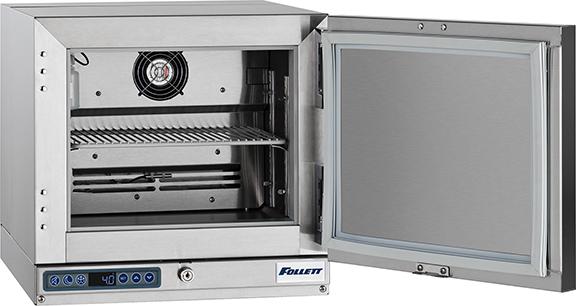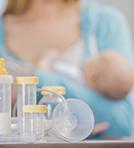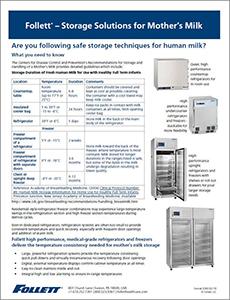
Make Mother's Milk Safer and Easier for Preemies with In-Room Refrigeration
For nearly every baby, breast milk is the very best source of nutrition – and that becomes critically important for babies born prematurely. Even in the absence of the ability to directly breastfeed, premature infants who receive expressed breast milk (EBM) are more likely to thrive and avoid serious complications related to their early arrival. In fact, breast milk is so healing it’s often thought of as “medicine” for these tiniest babies.
To support mothers and their newborns, providing breast milk in the Neonatal Intensive Care Unit (NICU) should be as easy and stress-free as possible. The availability of in-room refrigeration for EBM maximizes a mother’s convenience for storing and retrieving her milk. Access to a dedicated refrigerator also completely avoids potential milk mix-ups, allowing parents to feel confident in their baby’s milk supply.
Follett’s medical-grade countertop refrigerators offer superior temperature performance in a compact size perfect for the patient room. The 1-cubic-foot units fit on standard 24-inch-deep countertops and can be placed underneath standard 18-inch, wall-mounted cabinets. A lighted display confirms temperature at a glance, and sleep mode makes the unit a discreet room component. Stainless steel inside and out, with a dished bottom, Follett refrigerators are durable and easy to clean. A powerful compressor and forced air-cooling technology paired with CFC-free refrigeration and sound-reducing construction make these units the ideal solution for safely and conveniently storing EBM directly in the patient room.
Benefits of in-room EBM refrigeration with a Follett unit:
- Safe milk storage with tight temperature control and quick temperature recovery based on current CDC guidelines. [i]
- Convenience of having a day’s supply of milk just steps away.
- Reduced stress for the mother who knows that the milk she pumped is the same milk offered to her baby.
- Quick, visual confirmation of milk volume pumped in the last 24 hours.
- Easy placement in patient rooms thanks to small size and smart design.
- Isolated refrigeration components and enhanced insulation offer superior noise reduction.
[i] Centers for Disease Control and Prevention. Proper Handling and Storage of Human Milk. https://www.cdc.gov/breastfeeding/recommendations/handling_breastmilk.htm
Follett also offers larger medical refrigeration and freezer units that are ideal for OB/GYN central milk bank areas, and longer-term storage of mother’s milk. These upright units provide the same reliable temperature performance and are designed to meet the heavy use requirements of the hospital environment.
Learn more about the advantages of Follett medical-grade compact and full size refrigerators.

Tips for Better Breastfeeding in the NICU
For mothers of premature babies, establishing the ability to provide mother’s milk nutrition can be very challenging, physically and emotionally. Every preemie mom deserves support to make her best effort at breastfeeding in the NICU. [i]
Encourage skin-to-skin contact. Direct skin contact is beneficial for both mother and baby. Sometimes called “kangaroo care,” skin-to-skin touch encourages milk production, helps babies maintain stable body temperature and heart rate, and promotes bonding.
Provide access to a hospital-grade electric pump. Mothers who pump within the first few hours after delivery are more likely to establish a healthy milk supply and be successful at breastfeeding. Hospital-grade pumps are recommended, and insurance may cover the rental cost if medically necessary.
Arrange for lactation consultation. The hospital’s lactation consultant is an important part of the preemie care team. She can provide instruction on pumping technique and offer encouragement. Later, when the baby is ready, she can help with the transition to feeding directly at the breast.
[i] UC San Diego Health. Supporting Premature Infant Nutrition (SPIN). https://health.ucsd.edu/specialties/obgyn/maternity/newborn/nicu/spin/Pages/default.aspx

Are you following safe storage techniques for human milk? Download our reference sheet Storage Solutions for Mother's Milk



